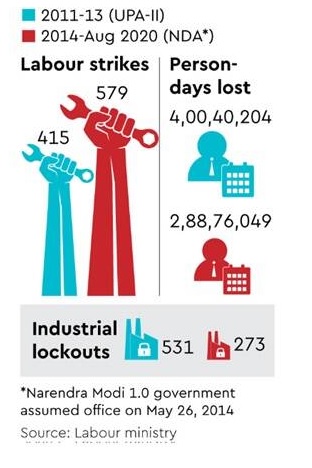An insight into the many labour and CTU protests against the new Labour Codes of India
Labour agitation not working out like the farmer agitation did
- The story: The repeal of three farm laws raised expectations in other agitations also, especially the ones against the labour law reforms (Labour Codes, 2019-20) and the CAA. Trade unions have now intensified their agitation.
- Why farmers won: In any agitation, what matters is - (i) staying power, (ii) total solidarity, (iii) political legitimacy, (iv) social visibility and (v) ability to hurt the opponents. Other than election related concerns, the farmers enjoyed political legitimacy as they were never consulted prior to the laws getting passed, nor were the Bills sent to any Parliamentary Standing Committee.
- Labour Codes and problems: Central Trade Unions (CTUs) have criticised the new Codes on three grounds -
- There was little debate on these Codes when they were passed. Trade unions reminded the govt. of not holding discussions with them, and claiming to the contrary. Lack of effective dialogue goes against the International Labour Organisation treaty called "the Tripartite Consultation Convention of 1976" that Indian ratified in 1978. Many rights have been taken away.
- The drafting of the Codes is quite shoddy and incomplete, contrary to the decades of collective legal and IR intelligence in India. Without evidence, many changes were made in "hire and fire", contract labour, etc. Many good clauses were diluted (e.g. inspections). Things were made complex (e.g. industrial tribunal, minimum wages). Promises were made without credible systems (social security fund, universal minimum wages). New structure will accelarate informalisation of workforce, because existing thresholds have been retained (PF, insurance) while legal thresholds have been liberalised (contract labour, hire and fire).
- Many gaps have been left, for the States to fill, which will lead to chaos as States will make different rules for the same thing.
- Strength of trade unions: They claim membership of 9-10 crore, including unorganised workers. They also claim that 15 to 25 crore participated in nationwide strikes. But the govt. has ignored completely then. So what's going wrong? There are at least six major reasons.
- Problem in labour agitation: First, the CTUs are divided due to their political affiliations. Out of 12, 10 are jointly leading agitations for repealing the four Codes, but the BMS is doing it separately. It has no problem with Wage and Social Security Codes, and wants "review" of other two (Industrial Relations / Occupational Safety, Health and Working Conditions Codes). Then there are many enterprise-base unions that do not necessarily support CTU's agitations.
- Regional vs. National: Second, the CTUs always managed to hold back labour law reforms at national level, but not at regional level. Silent support from governments has led to rampant labour flexibility being used by employers, in the form of contract labour. Formal labour laws don't allow that. So practically, "reforms" had already happened.
- Not organised: Third, the 40 crore unorganised workers of India are not organised in a manner that can threaten the government's survival. New Codes will further fragment them due to rising informality!
- Longer strikes not possible: Forth, unlike farmers, labour force cannot hold longer agitations due to fear of losing jobs and incomes. There are crores of unemployed people who can easily replace them. Their short duration strikes do not change things. They also recall the failure of the Railway Strike 1974 and Bombay textile workers strike 1982-83.
- Global pressure: Fifth, labour reforms are pushed even by IMF and WB globally. This is the neoliberal order ruling the world today, directly opposed to the interest of labour community.
- PSC scrunity: Sixth, the labour codes did go for PSC scrutiny, but most of its recommendations never made it to the final Codes! New clauses came in.
- Summary: A govt. already hurt by farm laws repeal will resist any more repeals. Unions now have to either hurt the existing government in the upcoming elections directly, or legally challenge the laws (as Gig workers did). Codes haven't been implemented as of now, due to economic situation, and pandemic, but soon they will be.
- EXAM QUESTIONS: (1) Explain the six key reasons the labour unions' battle to get the new Labour Codes repealed is not working out as well as the farmers' agitation did. (2) What are the major demands of the CTUs (central trade unions), in context of the new labour codes? Explain. (3) What are the problems inherent in the new labour laws, that go against established norms of decades? What are the neoliberal items visible in these Codes? Explain.
#labourcodes #labourreforms #labourrights #agitations
* Content sourced from free internet sources (publications, PIB site, international sites, etc.). Take your own subscriptions. Copyrights acknowledged.









